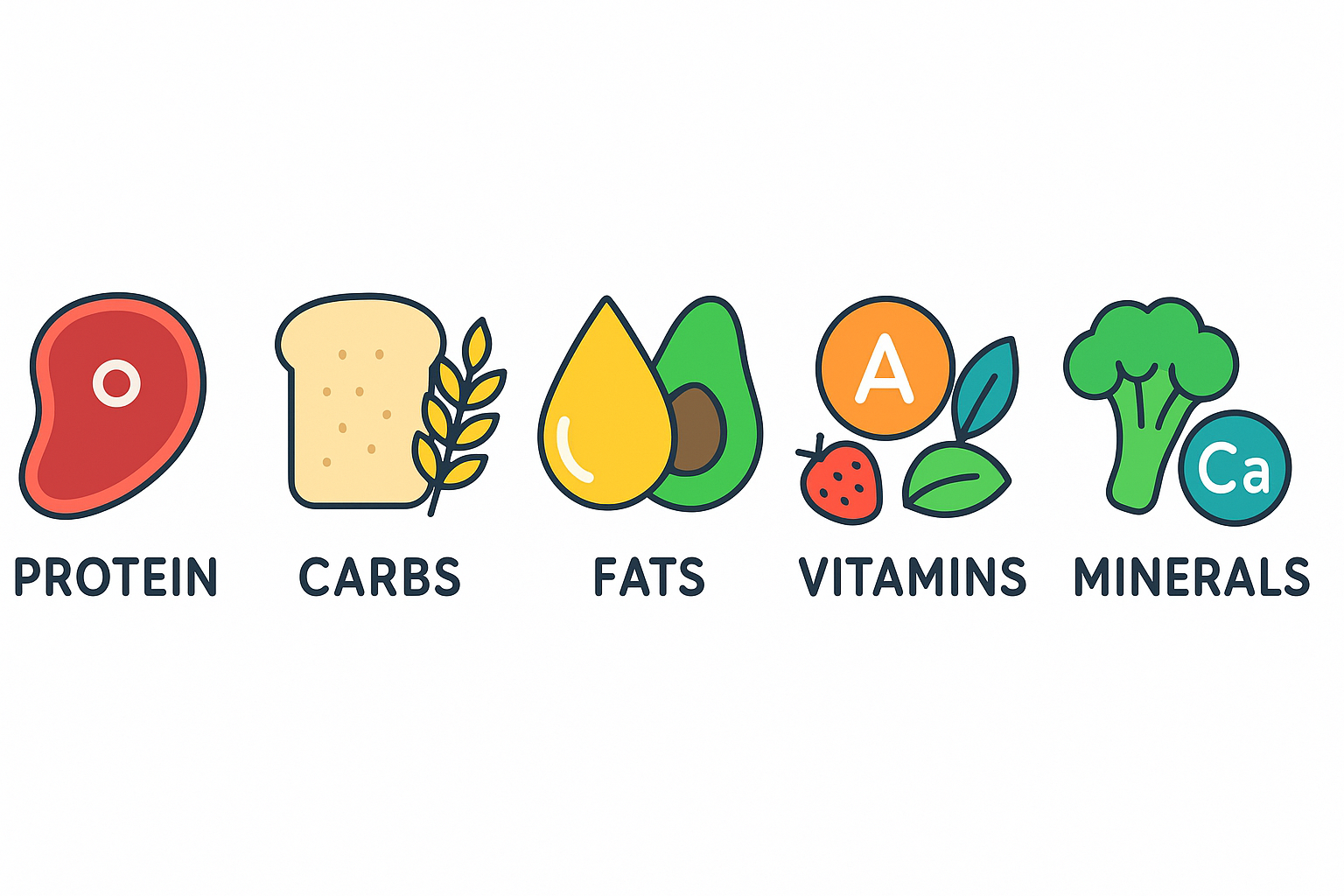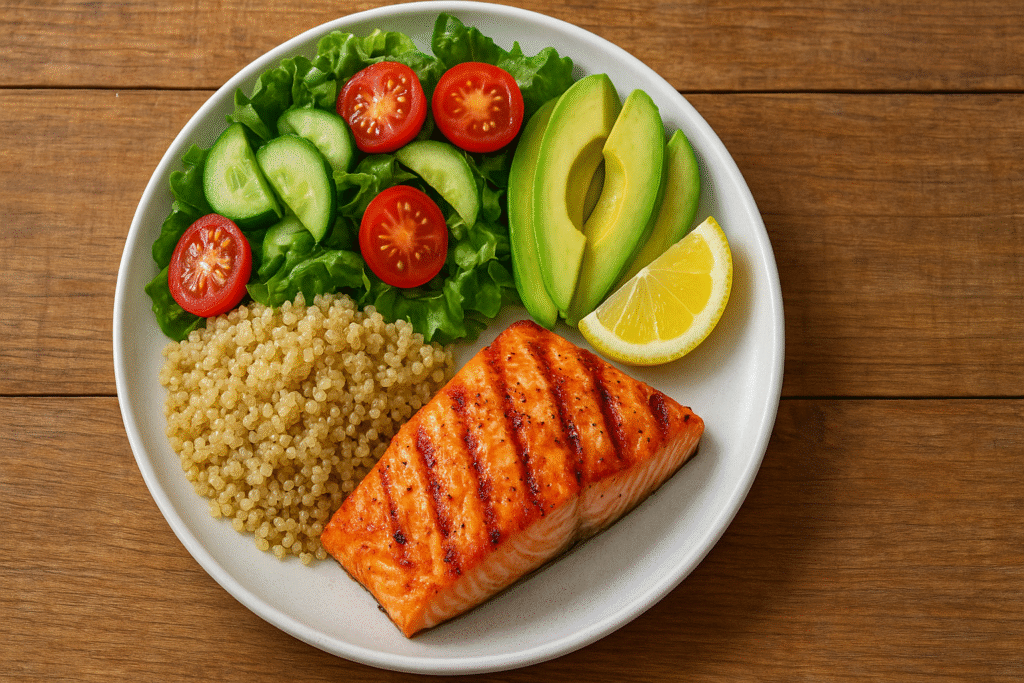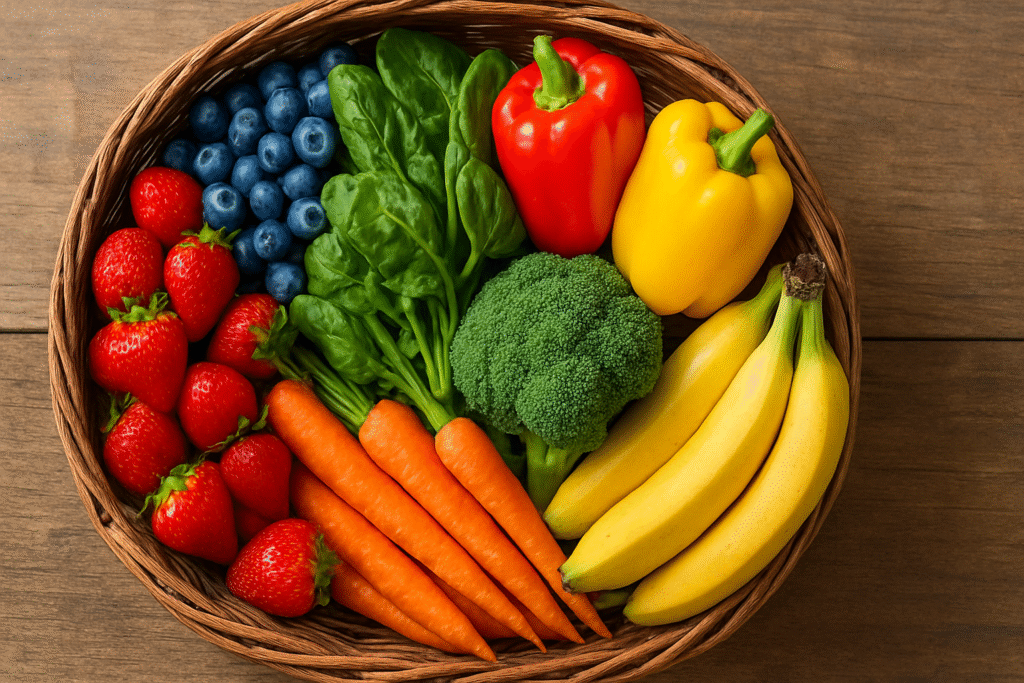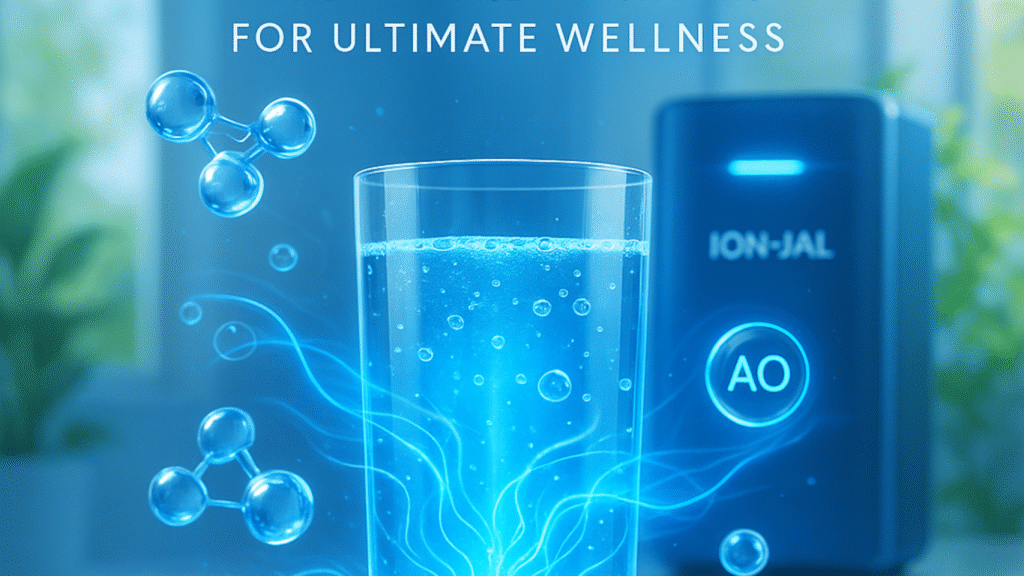Nutrition is really just how my body and your body get fuel so we can stay alive, keep moving, and feel great. It’s not really about limiting junk food or restricting calories. It’s about providing our bodies with the appropriate blend of fuel so we can think well, remain energetic, and feel good. When we refer to good nutrition, we’re referring to proteins that help construct and heal our body, carbs that provide us with sustained energy, healthy fats that guard our cells, vitamins and minerals that help things go along smoothly, and water to keep it all running. Without good nutrition, you and I both know what it is like — low energy, mood swings, getting sick all the time, and just not being our best selves.
I consider the body a machine, and perhaps you do as well. If we feed it cheap fuel or neglect maintenance, it is only a matter of time before it will begin to break down. You’ve likely had those days where you go out and grab something heavy, greasy, and you’re sluggish for hours, but other days you grab something fresh and well-balanced and you’re more alert, lighter, and ready to tackle things. That’s nutrition making its presence known out in the real world — no need for a textbook to read.
It also has a significant impact on the amount of energy we have. An oat, fruit, and nut breakfast will last us and me for several hours, whereas a pastry full of added sugars will have us buzzing for a while before the crash comes. And it’s not just energy. What we consume influences how we feel emotionally as well. Our brain relies on specific nutrients in order to create the chemicals that will make us feel calm, contented, or driven. Skip them, and we may end up short-tempered, anxious, or depleted.
Diet is also the armor that you and I bear against disease. The vitamins from fruits, antioxidants from vegetables, and health fats from fish or seeds all contribute to keeping our immune system robust. When it’s robust, we recover from colds more quickly, we get sick less, and we manage stress better. If we don’t take care of it, we’re effectively lowering our guard.
To me, good nutrition is not about being perfect or adhering to rigid diets, and I’m confident you do too. It’s about small, frequent decisions that enable our bodies to perform their best. Each meal is an opportunity for you and me to provide ourselves with something that bolsters our health — more energy for the day, greater focus for our work, or better defense against illness. When we perceive food as a companion in the way we live and feel, eating well no longer feels like a burden but something we truly desire to do.

What is Nutrition?
If you and I truly consider this, nutrition is literally the way we nourish our bodies so they can sustain us, keep us going, and feel their best. It’s not merely consuming in order to fill our bellies. It’s selecting foods that truly enable us to be strong, think clearly, and live well.
Our body operates on nutrients, and they exist in two primary categories:
Macronutrients — the ones we require in larger quantities:
Carbohydrates are our principal source of energy. They’re the fuel that run us around during the day — rice, bread, fruits, potatoes, and so on.
Proteins are the constructors. They fix muscles, skin, and even small cells that we can’t see. You obtain them from eggs, fish, beans, dairy, and so on.
Fats have a bad reputation, but healthy fats are essential. They shield our organs, save energy, and enable our brain to think clearly. Nuts and seeds, avocados, and fish are packed with them.
Micronutrients — the small ones we can’t live without but require in smaller doses:
Vitamins such as C, D, and B12 enable us to heal, generate energy, and maintain function inside.
Minerals such as iron, calcium, and potassium maintain our blood healthy, bones sturdy, and muscles in motion.
And then there are two unsung heroes that people generally overlook:
Water — Nothing gets done without it. It transports nutrients, regulates body temperature, aids digestion, and sustains every cell. When we don’t drink enough, we get tired, irritable, and out of sorts.
Fiber — It’s not something our body absorbs, but it keeps our digestion smooth, helps us feel full, and keeps our gut happy. You’ll find it in fruits, vegetables, beans, and whole grains.
So if I were to sum it up — nutrition is simply supplying our body with the right things, in the right quantities, so you and I can wake up energized, feel happy from the inside out, and continue to stay strong for years to come.

Importance of Good Nutrition
You and I both know that what we consume shows up in the way we feel. Good nutrition isn’t a “nice-to-have” — it’s the foundation that enables our body and mind to operate at their best.
- Physical health benefits
When we fuel our body with the right foods, we can feel it in our energy. A nutritious breakfast can carry us through the morning without that afternoon slump. Solid nutrition also makes our immune system strong, so we’re ill less often and recover faster when we do. And if we want to maintain weight, eating balanced meals with the ideal blend of protein, carbs, and good fats keeps our body naturally at a healthy weight — no fad diets necessary. - Mental health benefits
What you feed your body affects your brain as much as it affects your body. Brain foods can cause your brain to focus, think straight, and stay awake. Have you ever experienced how a greasy, heavy lunch makes it harder to focus? Or how new, vibrant foods make us feel more alert and light? That’s no mistake. Nutrition also has an awful lot to do with attitude. Certain nutrients help our brain produce the chemicals that make us feel relaxed, optimistic, and less stressed. - Disease prevention in the long run
This is the one that we might not directly notice right away, but it’s just as essential. Healthy consumption today can decrease the risk of serious disease in the future — heart disease, diabetes, high blood pressure, and certain cancers. It’s planting for a healthier tomorrow, sort of. You and I cannot control everything about how healthy we are, but we can control what ends up on our plate, and that’s a big step towards helping us protect ourselves for the long haul.
In the end, good nutrition is simply getting ourselves in the best position to live well — more energy today, clearer mind tomorrow, and healthier body down the line.

Components of a Balanced Diet
If you and I want to give our body what it actually needs, then that starts with a well-balanced diet. That is getting the correct ratio of different groups of food such that no part of our body is left empty.
Whole foods give us steady energy and keep us fuller for longer. Brown rice, oats, whole wheat bread, and quinoa not only energize us but also package fiber, which is just fabulous for digestion.
Lean protein is the repair team. They give repair to muscles, help our immune system, and keep us full after a meal. Eggs, chicken, fish, beans, tofu, and lentils are things that pop into mind.
Healthy fats protect our organs, feed the brain, and give us long-lasting energy. Nuts and seeds, avocados, olive oil, and fatty fish like salmon all have them.
Fruits and vegetables are nature’s multivitamins. They are filled with vitamins, minerals, antioxidants, and fiber. The more colors on the plate, the better — each color offers various health benefits.
Dairy or non-dairy products like milk, yogurt, or plant milks that are fortified with calcium and vitamin D give us the calcium and vitamin D necessary for a healthy bone and a healthy tooth. Almond milk, soy milk, or oat milk will do if dairy is not your choice and they are fortified.
And here’s the bit that people forget: variety and moderation. Eating the same thing every day might be easy, but it limits the amount of nutrients that our body is getting. It keeps foods interesting and our nutrition level fine. But concurrently, there should be moderation — even healthy foods become an issue if we overconsume them. It is not about perfection but about balance.
When we both make sure our meals have a little bit from every group — grains, protein, healthy fats, fruits, and vegetables — we’re giving our bodies exactly what they need to stay strong, fueled, and ready for whatever the day holds.
Nutrition Myths vs Facts
When we talk about nutrition, you and I have probably heard a whole lot of advice — some real, some half-true, and some absolutely false. The problem is, these myths spread like wildfire, and before we know it, they affect the way we feed. Let’s debunk some of the most popular ones with the facts as they actually are.
Myth 1: Carbs are bad for you
We’ve all heard the phrase, “I cut out carbs and lost weight.” True or not, however, the reality is — carbs are the body’s fuel. The problem isn’t carbs per se, it’s the type of carbs. Whole foods, fruits, and vegetables are healthy carbs that fuel our body and give us energy. It’s processed carbs like sweet treats, white bread, and pastries we need to limit.
Myth 2: Fat-free is always healthy
Sounds good, doesn’t it? No fat, no weight. No. The reality is that our body actually does require a little bit of healthy fats to sustain it. And plenty of “fat-free” products make up for lost fat by using sugar or artificial additives, which are not healthier at all. Instead of eliminating fat completely, consume the healthy fats in nuts, seeds, olive oil, and fish.
Myth 3: Eating late at night causes weight gain
Not the time, but the extra calories we eat. Nighttime snacking is usually high-calorie, high-fat foods, which can add up. If you must have a late-night snack, have a small, healthy one, like yogurt with berries or a handful of nuts.
Myth 4: Supplements will keep you healthy
For all of us, a balanced meal contains all the nutrients that we need. Supplements will fill in for it when we do not have something, but they are not an alternative to real food. You and I can’t just swallow a pill and anticipate that it will be just as good as real fruits, vegetables, and whole foods.
Myth 5: Skipping meals helps with weight loss
It might seem like eating fewer meals would mean you consume fewer calories, but skipping meals can slow down your metabolism and lead you to eat more later. Balanced, regular meals keep energy levels consistent and prevent overeating.
The Bottom Line:
Nutrition isn’t all about strict rules or believing everything we read in the headlines. It’s about having a sense of what our body needs and making fact-based choices, not fad ones. When you and I follow whole, balanced foods and avoid the extremes, we’re providing ourselves with the highest opportunity to feel good on the inside and out.
Tips for Improving Daily Nutrition

Improving nutrition isn’t about changing everything overnight. You and I both know that small, steady changes are easier to stick with and add up over time. Here are some simple habits that can make a real difference in our day-to-day eating.
1. Meal planning and portion control
If we wait until we’re starving to decide what to eat, it’s easy to grab something quick and unhealthy. Planning meals ahead — even just a day in advance — helps us make better choices. Cooking a little extra at dinner for tomorrow’s lunch can save time and keep us from relying on fast food. And when it comes to portion size, it’s not about eating tiny amounts, but about giving our body enough to feel satisfied without going overboard.
2. Reading food labels
Food packaging can be tricky. “Low-fat” or “sugar-free” doesn’t always mean healthy. By looking at the nutrition label, you and I can check for hidden sugars, excess sodium, and artificial additives. Ingredients are listed in order of quantity, so if sugar or refined flour is at the top, we know it’s not the best choice.
3. Hydration habits
Water is one of the easiest and most overlooked parts of good nutrition. Sometimes when we feel tired or hungry, we’re actually just dehydrated. Keeping a water bottle nearby and sipping throughout the day makes a big difference. Herbal teas or water infused with lemon, cucumber, or mint can keep it interesting without adding sugar.
4. Healthy snacking ideas
Snacks don’t have to be chips or biscuits. We can keep things simple — a handful of nuts, fresh fruit, yogurt with berries, hummus with carrots, or whole-grain crackers with cheese. Having healthy options ready means we’re less likely to reach for processed snacks when hunger hits.
In the end, improving our nutrition isn’t about perfection. It’s about being aware, making small smart choices, and building habits that fit into our everyday life. Every little step counts, and over time, you and I will feel the difference in our energy, mood, and overall health.
Nutrition & Health
You and I have seen how much good nutrition shapes our health — from keeping our energy steady to lifting our mood, protecting our immune system, and lowering the risk of future illness. A balanced diet isn’t about perfection or strict rules. It’s about giving our body the mix of whole grains, lean proteins, healthy fats, fruits, vegetables, and enough water it needs to work at its best.
If we want to start improving our diet today, we don’t have to overhaul everything at once. We can take small, simple steps: add an extra serving of vegetables to dinner, swap sugary drinks for water, plan tomorrow’s lunch tonight, or choose whole-grain bread instead of white. Little changes like these are easy to keep up — and over time, they make a big difference.
The key is consistency. You and I might not notice the results overnight, but with every healthy choice, we’re building a stronger, healthier future for ourselves. Let’s focus on progress, not perfection, and remember that every meal is a new chance to nourish our body and feel our best.
Ready to Put Good Nutrition Into Action?
📲 Download the TastyNest App today and start exploring health y recipes you can enjoy every day — because eating well should be as satisfying as it is good for you.

